nce lesson5
新概念课文文本-中英对照NCE1
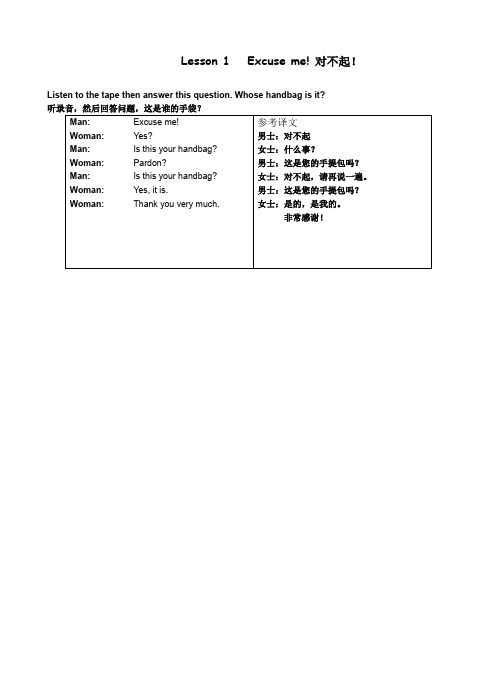
Lesson 1 Excuse me! 对不起!Listen to the tape then answer this question. Whose handbag is it?听录音,然后回答问题,这是谁的手袋?Lesson 3Sorry, sir. 对不起,先生。
Listen to the tape then answer this question.听录音,然后回答问题。
这位男士有没有要回他的雨伞?Lesson 5Nice to meet you 很高兴见到你Listen to the tape then answer this question. Is Chang-woo Chinese?听录音,然后回答问题。
昌宇是中国人吗?Lesson 7Are you a teacher? 你是教师吗?Listen to the tape then answer this question. What is Rober's job?听录音,然后回答问题。
罗伯特是做什么工作的??Lesson 9 How are you today? 你今天好吗?Listen to the tape then answer this question. How is Emma?听录音,然后回答问题。
埃玛身体好吗?Lesson 11 Is this your shirt? 这是你的衬衫吗?Listen to the tape then answer this question. Whose shirt is white?听录音,然后回答问题。
谁的衬衣是白色的?Lesson 13 A new dress一件新连衣裙Listen to the tape then answer this question. What colour is Anna's hat? 听录音,然后回答问题。
安娜的帽子是什么颜色的?Lesson 15 Your passports, please.请出示你们的护照。
NCE2Lesson5

★distance n. 距离 • 保持距离 • keep distance • distant adj.远距离的 • importance n. 重要 • important adj. 重要的 • difference n. 不同 • different adj. 不同的
★request • ① n. 要求, 请求 • request for 对……有请求, 有需求 • 他同意了我延长时间的请求。 • He agreed with my request for more time. • 她向加里请求帮助。 • She sent a request for help to Gary. • ② v. 要求, 请求 • request sb.to do sth. 要求某人做…… • =ask sb.to do sth. • (对人要求习惯用被动语态) • 在饭店里不能吸烟。 • You are requested not to smoke in the restaurant.
Grammar
2一般过去时常与具体的表示过去的时间状语连用; 现在完成时通常与模糊时间状语连用或无时间状语。
一般过去时的时间状语: yesterday, last week,…ago, in1990, in October, just now, …-- 具体的时间状语 现在完成时的时间状语: for, since, so far, ever, never, jus yet, till/until, up to now, in the past few years, recently … --模糊的时间状语 句子中如有过去时的时间副词(如 yesterday, last, week, in 1960)时,不能使用现在完成时,要用过去时 错Tom has written a letter to his parents last night. 对Tom wrote a letter to his parents last night.
NCE2Lesson5

Lesson 5
No wrong numbers
• Watch the video then read after it.
No wrong numbers New Lesson Mr. James Scott has a garage in Silbury and now he has just bought another garage in Pinhurst. Pinhurst is only five miles from Silbury, but Mr. Scott cannot get a telephone for his new garage, so he has just bought twelve pigeons. Yesterday, a pigeon carried the first message from Pinhurst to Silbury. The bird covered the distance in three minutes. Up to now, Mr. Scott has sent a great many requests for spare parts and other urgent messages from one garage to the other. In this way, he has begun his own private telephone service.
1--Has John come ? --Yes. He has A been here for 10 minutes. A.yet, already B.already, yet C. already, already D. yet, yet
A in the last 2.What _____ ten years? A. has happened B. happened C. happen D. happens
新概念第二册 Lesson 5 No wrong numbers

service
serve /sɜː(r)v/ v. 服务
service /ˈsɜː(r)vɪs/ n. 业务,服务
customer service 客服
service industry /ˈɪndəstr/ 服务业
Listen & then answer the question
What does ‘No wrong numbers’ mean?
urgent message from one garage to the other. In this
way, he has begun his own private ‘telephone’ service.
in this way
up to now. (=up till now)
adv. 到现在为止; 作时间
D. Pinhurst is only five miles from Filbury, but Mr.Scott cannot get a
telephone for his new garage, so he has just bought twelve pigeons.
E. Mr. Jame Scott has a garage in Silury and now he has just bought
状语, 句子时态多用现在
完成时)。
a great many 许多的, 其中
great表示数量很大;只能
同可数名词的复数连用。
adv. 用这个办法
参考译文
詹姆斯·斯科特先生在锡尔伯里有一个汽车修理部,现在他刚在平
赫斯特买了另一个汽车修理部。平赫斯特离锡尔伯里有只有5英里,
但詹姆斯.斯科特先生未能为他新的汽车修理部搞到一部电话机,
NCE3_Lesson_5
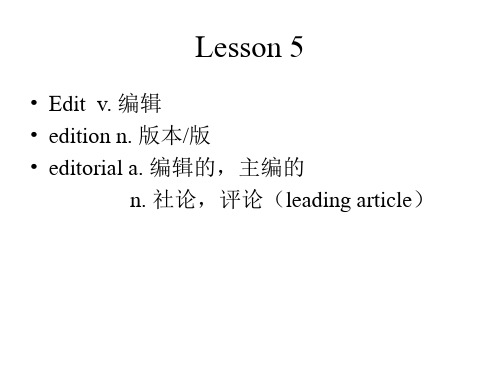
• gain不强调个人的付出,强调最终“得到” 的这个结果或状态。 • 假期之后,我长胖了…… • After the vacation, I gained weight.
• 我希望你们能获得更大的成就。 • I hope you will gain still greater success.
Line 10
• get/obtain/acquire/gain都含“得到”, “获得”的意思
• obtain 是较正式用语,常指“通过努力工 作、奋斗或请求而得到所需的东西”,表 示通过努力才得到或找到某木;比get正式, 用语正式场合
• 他通过实践获得了经验。 • He obtained experience through practice.
• teach • 为常用词,表示“帮助某人学会某项知识 或技能;是可以带双宾语的唯一一个表示 ‘教’的动词” • 基本用法: • teach sb. sth./ teach sth. to sb./ teach sb.to do sth.
• instruct • 通常用于正式文体中,表示给某人传授知 识,它的宾语只能是人,不能带双宾语。 • 基本用法: • instruct sb. in (doing) sth.
Lesson 5
• Edit v. 编辑 • edition n. 版本/版 • editorial a. 编辑的,主编的 n. 社论,评论(leading article)
• Extreme n.极端 • go to extremes 走极端 • go to extremes to do:做„事情走极端
• Meanwhile = in the meantime
• 半夜时分,我扮演沙发土豆的角色(看电 视),同事,他在探索数学难题。 • In the midnight, I was playing the part of couch potato, meanwhile, he was exploring a math problem.
(最新版)新概念英语第四册-lesson-5-青年---new-concept-english-4-lesson-five-youth

用助动词do / does / did+动词原形表强调
• I saw Sheldon on the street last night.
did see
助动词随人称的数、时态变化
not...until…
He didn’t know it was a prank until he came into the office. take leave to doubt—then it is older people who create it, not the young themselves.
在英语中,我们常用It is / was……that……结构来突出强调句 子的某一成分。 在这个句型中,it没有词汇意义,只是引出被强调的成分。
But the point of much recent work is that in essence nothing has changed since 1944. I take leave to doubt this.
北京新东方 英语学习部
But the point of much recent work is that in essence nothing has changed since 1944. I take leave to doubt this.
If there is one—which I take leave to doubt—then it is older people who create it, not the young themselves.
北京新东方 英语学习部
if there is one中的 one 指 a problem of youth。 呼应主题 (主题词复现)
新概念英语第二册第5课NCE_2_Lesson_5lyf

过去一般时和现在完成时区别: 3)现在完成时可表示持续到现在的动作或状态,动词一般是延 续性的,如live, teach, learn, work, study, know. 过去时常用的非持续性动词有come, go, leave, start, die, finish, become, get married等。 e.g. I saw this film yesterday. (强调看的动作发生过了。) I have seen this film. (强调对现在的影响,电影的内容已经知道了。)
• • • •
I _______ to him last month. write I ______ this car last year. buy He ______ to see me this morning. come I _____ him ten minutes ago. see
• The bird covered the distance in three minutes. • cover: 完成一段行程。 • They have covered 60 miles since yesterday morning. • I covered the distance in 5 minutes by car. • I covered the distance in 20 minutes on foot.
Language points
• Pinhurst is only five miles from Silbury.
• The bank is about five minutes’ walk away. • 我家离学校七公里。 • 我家开车到学校十五分钟。
• Yesterday, a pigeon carried the first message from Pinhurst to Silbury. carry a message 传递信息。 (carry:运送,传递) Can you carry this package to the post office for me?
nce知识点(1-40)
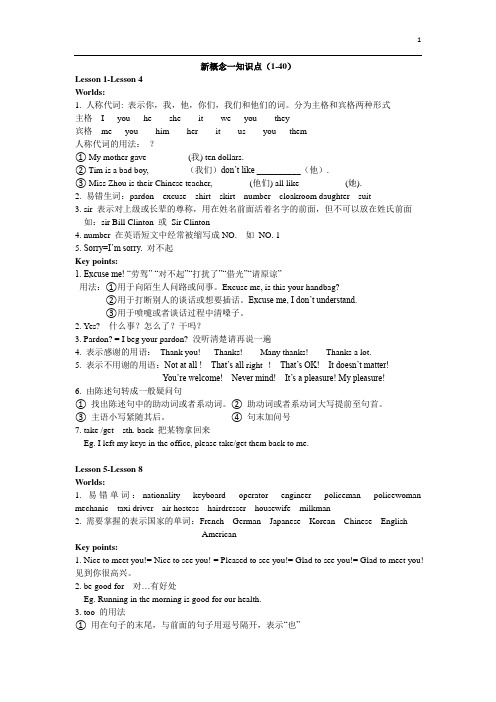
新概念一知识点(1-40)Lesson 1-Lesson 4Worlds:1. 人称代词: 表示你,我,他,你们,我们和他们的词。
分为主格和宾格两种形式主格I you he she it we you they宾格me you him her it us you them人称代词的用法:?① My mother gave _________(我) ten dollars.② Tim is a bad boy, ________(我们)don’t like __________(他).③ Miss Zhou is their Chinese teacher, ________(他们) all like __________(她).2. 易错生词:pardon excuse shirt skirt number cloakroom daughter suit3. sir 表示对上级或长辈的尊称,用在姓名前面活着名字的前面,但不可以放在姓氏前面如:sir Bill Clinton 或Sir Clinton4. number 在英语短文中经常被缩写成NO. 如NO. 15. Sorry=I’m sorry. 对不起Key points:1. Excuse me! ―劳驾‖ ―对不起‖―打扰了‖―借光‖―请原谅‖用法:①用于向陌生人问路或问事。
Excuse me, is this your handbag?②用于打断别人的谈话或想要插话。
Excuse me, I don’t understand.③用于喷嚏或者谈话过程中清嗓子。
2. Yes? 什么事?怎么了?干吗?3. Pardon? = I beg your pardon? 没听清楚请再说一遍4. 表示感谢的用语:Thank you! Thanks! Many thanks! Thanks a lot.5. 表示不用谢的用语:Not at all ! That’s all right !That’s OK! It doesn’t matter!You’re welcome! Never mind! It’s a pleasure! My pleasure!6. 由陈述句转成一般疑问句①找出陈述句中的助动词或者系动词。
新概念英语第二册第5课NCE_2_Lesson_5剖析讲解
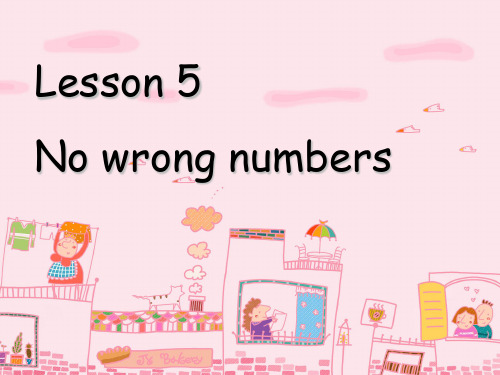
Lesson 5 No wrong numbers Mr. James Scott has a garage in Silbury and now he has just bought another garage in Pinhurst.
now, very soon, or very recently: "Where are you, Jim?" "I'm just coming."
Lesson 5 No wrong numbers Yesterday, a pigeon carried the first message from Pinhurst to Silbury.
电话用语 Can I take a message for you? Can you take a message for me?
1.How far is it from Silbury to Pinhurst? five miles
2.How many pigeons has he bought? twelve pigeons
3. How much time did the bird cover the distance? in three minutes
Lesson 5 No wrong numbers
这些标志大家认识吗?
这些标志大家认识吗?
HONDA 本田
MITSUBISHI 三菱
这些标志大家认识吗?
福特FORD 通用别克BUICK 雪佛兰CHEVROLET
凯迪拉克CADILLAC
这些标志大家认识吗?
大众 VOLKSWAGEN 奥迪AUDI 宝马BMW 奔驰BENZ 法拉利FERRARI 劳斯莱斯ROLLS-ROYCE
NCE2 Lesson 5 No wrong numbers

★cover v. 越过 cover:盖子/覆盖 cover+距离 : 越过 cover the distance
★distance n. 距离 distant:(a)远距离的 importance:(n.)重要 important:(a.)重要的 difference : (n.)不同 different:(a.) 不同的
up to now:到现在为止(现在 完成时) a great many:许多(+可数名 词复数) a great number of : 许多(+ 可数名词复数)
in this way:这样,以这种方 式 in a friendly way in a way : 从某种意义上来 说: In a way,you are kind. in the way:挡路: Sorry,you are in the way.(在口语中很 少用, 一般用Excuse me)
6. I _______the floor yet. B A. hasn’t swept B. haven’t swept C. don’t sweep D. didn’t sweep
3.A few years ago, friends A me some beautiful Foshan pottery. A gave B give C have gave D have given
现在完成时和一般过去时
has worked He ____________(work) in our school for one year.
He ______(come) to our school last year/in came 2002.
have cooked They _______________(cook) the supper already.
新概念英语第二册Lesson5课件(共28张PPT)
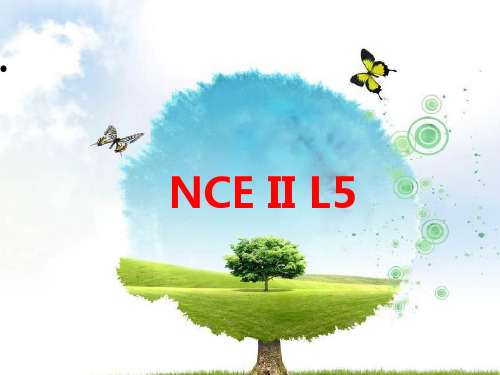
v. 要求,请求 request sb. to to sth. ask sb. to do sth. You are requested not to smoke
in the restaurant.
spare 多余的,空闲的
[speə(r) ] adj.
v. 抽出(时间等), 让给 Have you got five minutes to spare? v. 饶恕,赦免 The robbers spared his life. adj. 多余的,空闲的,剩下的,备用的 You can sleep in the spare bedroom. I have no spare time now.
4.Some boys are playing football, and __o_t_h__e_r_s_ are playing basketball.
v. 覆盖
Snow covered the whole village. The village is covered with
snow. be covered with Put a cover on the box. n. 覆盖物
distance 距离
[ˈdɪstəns ]
n.
keep distance 保持距离 distant adj. 远距离的
2.I cooked the food i_n__t_h_e__w__a_y_ you showed me.
3._B_y__t_h__e__w__a_y_, where is my coat? 4.Yes, __i_n__a__w__a_y_ he has been very
successful. 5.Children get i_n__t_h_e__w__a_y_ during the
NCE1-L5-6课

国籍与国家名称有别 请不要将国家名称和与其对应的国 籍搞混。课文的French,German, Japanese,Korean以及Chinese都 是表示国籍的词。句中表示中国国 籍的词应为Chinese而不是China。
美国Americ USA
American
美国的,美国人
瑞典Sweden
Swedish 瑞典的,瑞典人
“Nice to meet you .”
too也 通常放在肯定句或者疑问句的末尾, 和句子的主干部分用”,”隔开。 She is French. Iam French, too. 在否定句中用”either”表示”也”,也是 常常放在句末,和句子的主干部分 用”,”隔开。 I am not Japanese, either.我也不是 日本人。
n. n. adj n. n.
练一练
1. Excuse B ____ ! Is this your hamdbag? A. you B. me C. it D. I 2. --Is this your umbrella? -- No, it D ____ . A. is B. not is C. my D. isn’t A 3. – What is your name? –Pardon? --_____ A. What is your name? B. Is this your hamdbag? C. Thank you very much! D. Nice to meet you.
人们在正式的场合初次见面时常用: How do you do? 相应的回答也是:How do you do? 这是一句问候语,并非问话。
nice
① adj. 美好的,好看的 It’s a nice day today, isn’t it? That's a nice shirt. ② adj. 和蔼的,友好的 He is very nice to his neighbours. ③ adj. 使人高兴的,令人愉快的 It is so nice to have you here.
NCE1L5
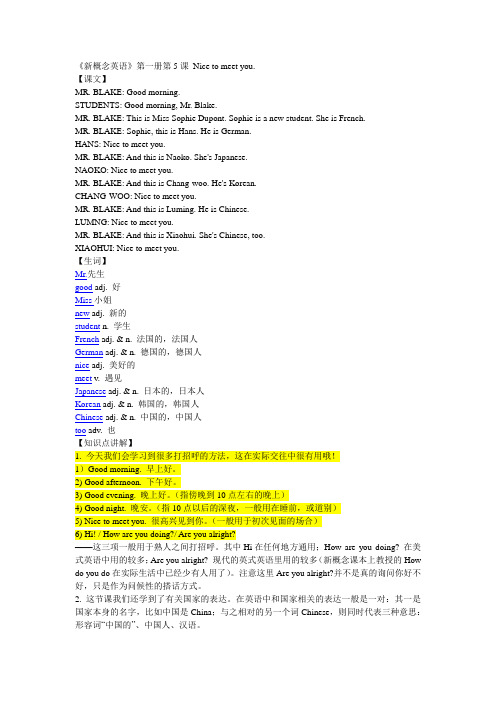
《新概念英语》第一册第5课Nice to meet you.【课文】MR. BLAKE: Good morning.STUDENTS: Good morning, Mr. Blake.MR. BLAKE: This is Miss Sophie Dupont. Sophie is a new student. She is French.MR. BLAKE: Sophie, this is Hans. He is German.HANS: Nice to meet you.MR. BLAKE: And this is Naoko. She's Japanese.NAOKO: Nice to meet you.MR. BLAKE: And this is Chang-woo. He's Korean.CHANG-WOO: Nice to meet you.MR. BLAKE: And this is Luming. He is Chinese.LUMNG: Nice to meet you.MR. BLAKE: And this is Xiaohui. She's Chinese, too.XIAOHUI: Nice to meet you.【生词】Mr.先生good adj. 好Miss小姐new adj. 新的student n. 学生French adj. & n. 法国的,法国人German adj. & n. 德国的,德国人nice adj. 美好的meet v. 遇见Japanese adj. & n. 日本的,日本人Korean adj. & n. 韩国的,韩国人Chinese adj. & n. 中国的,中国人too adv. 也【知识点讲解】1. 今天我们会学习到很多打招呼的方法,这在实际交往中很有用哦!1)Good morning. 早上好。
新概念英语第一册 第5-6课 NCE Lesson 5-6

What make is it? It’s a Mercedes. It’s a German car.
What make is it? It’s a Toyota. It’s a Japanese car.
What make is it? It’s a Daewoo. It’s a Korean car.
Lesson 5 Nice to meet you
很高兴见到你
Review
•这是我的...... Here's my...
•这个不是我的...... This is not my...
•号码的表达方法 Number...
Words Review
• umbrella • please • here • ticket • number • sorry • sir
Sophie is a new _s_tu_d_e_n_t_ . _S_h_e__is French
Sophie , This is Hans . He is German.
Nice to meet you .
And __th_is__is__Naoko.
She is Japanese. “_N_ic_e__to__m_e_e_t_y_o_u_ .”
And this is Chang-woo.
He’s _K__o_re_a_n__. “N_i_c_e_t_o_m__e_e_t _y_o_u.”
And this is Luming.
He’s _C_h_i_n_e_s_e__ .
“Nice to meet you .”
And this is Xiaohui .
How many students are there?
新概念英语二第5课课件
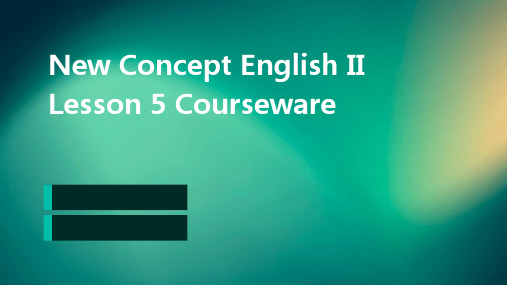
Course outline
Unit 4
Reading and comprehension, including reading passages and exercises to improve students' reading comprehension skills.
Unit 6
Writing practice, including writing assignments and feedback on students' writing to improve their writing skills.
expansion
01 Course Introduction
Course objectives
Language knowledge
To enhance students' understanding of English grammar and vocabulary through interactive and engaging activities.
Additional
05 information and expansion
Related video materials
Video 1
"Introduction to the lesson"
Video 2
"In-depth analysis of the lesCourse Summary and Review
Key review of this lesson
01
Grammar
Present perfect continuous tense
02
03
NCE-1 L5教案
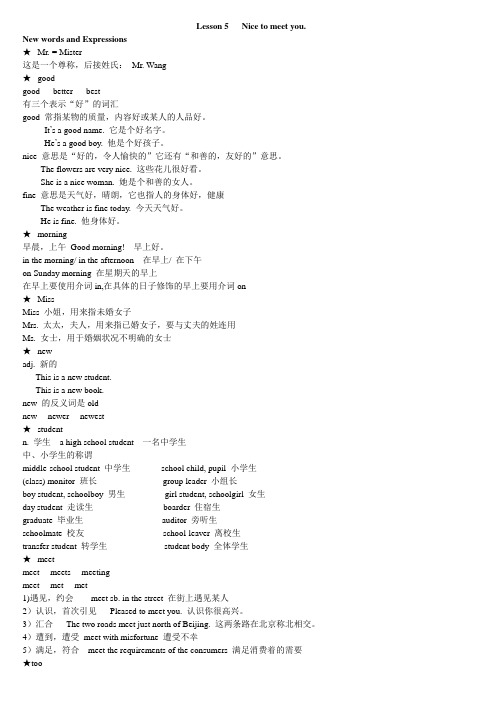
Lesson 5 Nice to meet you. New words and Expressions★Mr. = Mister这是一个尊称,后接姓氏:Mr. Wang★goodgood --- better --- best有三个表示“好”的词汇good 常指某物的质量,内容好或某人的人品好。
It’s a good name. 它是个好名字。
He’s a good boy. 他是个好孩子。
nice 意思是“好的,令人愉快的”它还有“和善的,友好的”意思。
The flowers are very nice. 这些花儿很好看。
She is a nice woman. 她是个和善的女人。
fine 意思是天气好,晴朗,它也指人的身体好,健康The weather is fine today. 今天天气好。
He is fine. 他身体好。
★morning早晨,上午Good morning! 早上好。
in the morning/ in the afternoon 在早上/ 在下午on Sunday morning 在星期天的早上在早上要使用介词in,在具体的日子修饰的早上要用介词on★MissMiss 小姐,用来指未婚女子Mrs. 太太,夫人,用来指已婚女子,要与丈夫的姓连用Ms. 女士,用于婚姻状况不明确的女士★newadj. 新的This is a new student.This is a new book.new 的反义词是oldnew ---newer--- newest★studentn. 学生 a high school student 一名中学生中、小学生的称谓middle-school student 中学生school child, pupil 小学生(class) monitor 班长group leader 小组长boy student, schoolboy 男生girl student, schoolgirl 女生day student 走读生boarder 住宿生graduate 毕业生auditor 旁听生schoolmate 校友school-leaver 离校生transfer student 转学生student body 全体学生★meetmeet ---meets ---meetingmeet ---met ---met1)遇见,约会meet sb. in the street 在街上遇见某人2)认识,首次引见Pleased to meet you. 认识你很高兴。
新概念英语第二册第5课NCE_2_Lesson_5剖析讲解

in three minutes = no more than three minutes
Lesson 5 No wrong numbers
The bird covered the distance in three minutes.
keep distance:保持距离 中国人往往喜欢和人靠的很近,而英国人喜欢保持 一定距离,他们认为自己周围的一切,包括空气都 是自己的, 一米安全距离。所以在餐厅吃饭,想和 英国人坐一桌,应该先问:Can I join you? 或Can I share this table?而不要直接去坐。
Lesson 5 No wrong numbers
这些标志大家认识吗?
这些标志大家认识吗?
HONDA 本田
MITSUBISHI 三菱
这些标志大家认识吗?
福特FORD 通用别克BUICK 雪佛兰CHEVROLET
凯迪拉克CADILLAC
这些标志大家认识吗?
大众 VOLKSWAGEN 奥迪AUDI 宝马BMW 奔驰BENZ 法拉利FERRARI 劳斯莱斯ROLLS-ROYCE
In China, nowadays, more and more people have their own private cars. However, most of people still use a kind of convenient, cheap environmental vehicle, bicycle.
Байду номын сангаас
过去一般时和现在完成时区别: 3)现在完成时可表示持续到现在的动作或状态, 动词一般是延续性的,如live, teach, learn, work, study, know. 过去时常用的非持续性动词有come, go, leave, start, die, finish, become, get married等。
- 1、下载文档前请自行甄别文档内容的完整性,平台不提供额外的编辑、内容补充、找答案等附加服务。
- 2、"仅部分预览"的文档,不可在线预览部分如存在完整性等问题,可反馈申请退款(可完整预览的文档不适用该条件!)。
- 3、如文档侵犯您的权益,请联系客服反馈,我们会尽快为您处理(人工客服工作时间:9:00-18:30)。
• • • • • • •
★impatient adj.不耐烦的 patience(n.耐性) patient(adj.有耐心的) patiently(adv.有耐心地) impatience(n.不耐烦) impatient(adj.不耐烦的 impatiently(adv.不耐烦地)
★fire v.解雇(口语) -- He was fired from his job dismiss vt.解雇(正式) -- The manage dismissed him from his company. Sack vt.解雇, 辞退(俚语, 口语) -- If you do it wrong again you will be sacked.
Read the new words
Read and then answer the question
• What was the consequence of the editor's insistence on facts and statistics? • Consequence n.结果 • Insistence n.坚持, 坚决主张
Competition2: words
• • • • • • • • 1. tell sb formally to do sth 2. to be all around sb or sth 3. dismiss sb from a job 4. in the beginning, at first 5. to seize and hold sb according to law 6. print; go to press 7. of the highest degree 8. a collection of information shown in numbers
• • • •
9. at the same time 10. get; gain 11. unwillingly 12. unable to deal calmly with sth or wait for sth
Competition 3: Phrases
• • • • • • 1. not succeed in doing 1’ 2. cause 1’ 3. get down to doing 2’ 4. also 1’ 5. take sb to jail 1’ 6. go to print 1’
Last year a journalist had been instructed by a well known magazine to write an article on the president's palace in a new African republic.
ห้องสมุดไป่ตู้
• African n.非洲人 adj.非洲的 • Republic n.共和国, 共和政体 • Instruct vt.教, 教导, 命令, 指示, 通知 instruct sb to do sth.=tell sb formally to do sth 正式告诉某人做某 The teacher instructed him to take the examina tion. On = about 侧重强调课题专一 - a book on radio
= set about doing 决定, 打算, 着手做... He set out to make his first 1,000,000 in 5 years take sb a long time to do sth 某事花了某人很久的时间 It took me five days to write the article.
• Why was the editor dissatisfied with the first sentence? • Because it was too general. • Did he refuse to publish it? • Yes, he did. • What did the editor instruct the journalist to find out? • The exact number of steps and the height of the wall.
• • • • • • • • • • •
Editor n.编辑 Edit vt.编辑 Edition n.编辑 Editorial adj.编辑的, 主编的 n.社论, 评论 extreme n.极端 statistics n.统计数字 journalist n.新闻记者 reporter n.(电视台)记者 correspondent n.(电台)记者, 通讯员 president n.总统
• Was the journalist able to supply this information immediately? • No, he wasn’t.
• Why was the editor getting impatient? • Because the magazine would soon go to press.
Competition1: reading comprehension
• • • • • Requirements: 1. work and discuss in your group 2. prepare questions for other groups 3. get ready for questions 4. get different points according to how you asked and whether you can answer correctly • 5. every group has three chances
• Why hadn’t the journalist faxed sooner? • Because he has been arrested and sent to prison.
New words and expression 1
• editor n. edit vt. edit magazine, edit newspaper edition n. editorial [‘edi’tɔ:riəl] adj. 编辑的, 主编的 n.社论, 评论
journalist n. reporter n.(电视台)记者 --sports journalist 体育记者 --journalism-n. 新闻学; 新闻业 --journalistic-adj. 新闻事业的, 新闻工作者 的
publish v.出版 = print(vt.), go to press(vi.) The book will be published. = The book will be printed The book will go to press.
• How many more faxes did he send the journalist? • 3. • What did the last one say? • That the journalist would be fired if he didn’t replay.
• What happened to the original article the journalist had written? • It was published. • How long was it before the journalist could fax the editor? • A week.
• The article began: 'Hundreds of steps lead to the high wall which surrounds the president's palace'. • which 指代the high wall
• The editor at once sent the journalist a fax instructing him find out the exact number of steps and the height of the wall. Instructing(现在分词)进一步补充说明fax的 情况 -- he send me a letter instructing me to come back immediately
• What had a journalist been instructed to do? • write an article on the president's palace in a new African republic.
• How long ago was this?
• This year.
• extreme n.
• • • • go to extreme(s) to do… 做某事走极端 1. He went to extreme to say that the film was the best one. 2. He went to extremes to say that his girlfriend was the most beautiful in the world. go from one extreme to the other 从一个极端走向另一个极端
The journalist immediately set out to obtain these important facts, but he took a long time to send them.
set out to do = decide and try to do
决定, 打算, 着手做...
Comprehension questions
• How do editors of newspapers and magazines often go to extremes? • By providing their readers with unimportant facts and statistics.
